CoMManDO Research Conference 2023
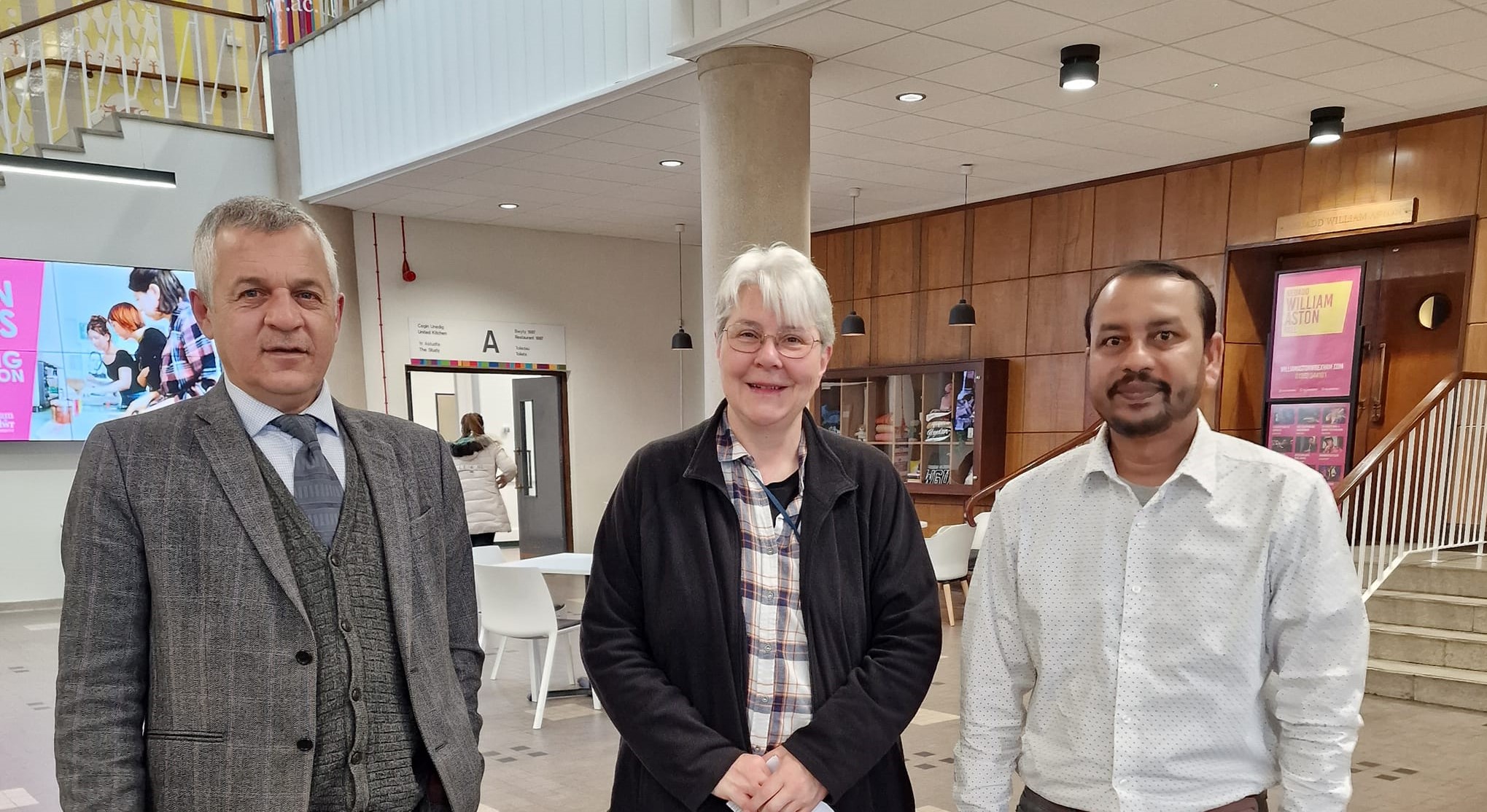
April 2023
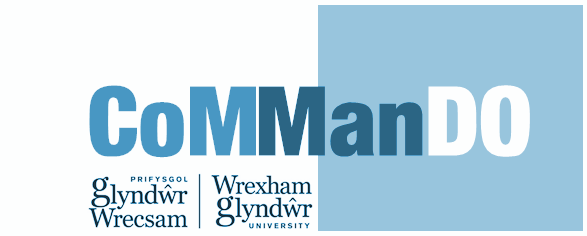
Last week, Wrexham University hosted the CoMManDO Research Centre Conference 2023, led by Professor of Aerospace Engineering, Alison McMillan. The Conference brought together researchers and students from across the country and the USA to discuss the latest research developments in a variety of fields, not only Engineering.
Why are Documents Structured the way they are?
On Thursday, Visiting Researchers at the University and students from a local school joined Alison for some workshops on document structure and peer reviewing. The workshop began with a historical overview of the way documents were conventionally structured and an introduction of the New Scientific Method – Francis Bacon’s ‘Novum Organum’ and The Royal Society.
The Royal Society, one of the world's oldest scientific societies, was founded in 1660 in London. Its inception was the result of a group of intellectuals, including scientists, mathematicians, and philosophers, who began meeting regularly to discuss ideas and share their knowledge. The group's aim was to promote the pursuit of scientific knowledge and the advancement of science for the benefit of humanity. The society quickly gained prestige, attracting some of the greatest minds of the time and was given royal chartered status by King Charles II – this legitimised the study of science and showed support from the monarchy.
Alison then brought the workshop back to the present day and explained the best ways of writing and formatting articles, namely, by using the vital keywords in the title, ranking the most important sentences and chopping the excess, and not getting ‘prior art’ confused with novel knowledge and findings. For example, literature reviews and methodology are summarising and repeating what others have previously done, whereas results sections are the novel facts, and finally the discussion is opinion, demonstrating your informed interpretation of the facts.
Dr Emma Harrison, Research Impact Manager who attended the workshop said,
"Alison framed the different sections of a journal article in such a logical way that I would highly recommend people take a look at the slides if they’re confused about what should go into which section of an academic paper"
Peer Reviewers are not the Enemy!
The next workshop tackled the subject of peer reviews. It’s a sour subject for some, as constant rejection can get people down, but this session was dedicated to adopting a different perspective.
Peer review provides a proxy for the intended audience, and therefore, if the peer reviewers don’t understand different sections of your paper, it is unlikely that your intended audience would. This gives you the opportunity to improve your work and communication, as that’s the whole point of publishing research! Publishing is unlike presenting at an event, where you can get immediate feedback and people can ask for clarification; in a written piece of work, a reader is left pondering what something means with no practical way of asking the author ‘what exactly did you mean?’
Alison suggests that we don’t read too much into the reviewers’ comments and keep in mind that they are trying to be thorough and helpful. Feedback is there to help change a good paper into an excellent paper. You want to feel as proud of that paper as you can, and look back on it 20 years later knowing that you gave it your all.
Main Conference
In the afternoon, Dr Salim Miah, from Hertfordshire University, who is also a Visiting Researcher and PhD Alum at Wrexham University, began the presentation sessions with a fascinating discussion on the Investigation of Oil Recovery using Rotating Disks. Oil spills pose significant and devastating issues on the environment and ecosystem, and a pioneering invention like this is unfortunately urgently required for clean-ups.
Next, Elena Cassidy-Smith, PhD Student at Wrexham University jumped onto the subject of time, and an exploration of our experiences of time in different situations. Elena is conducting a practice-based PhD and the work explores the intersections of art, physics, philosophy and society, seeking to challenge accepted notions of time. Elena was also a runner-up in our Visualising Research competition this year, and the prize-winning image was included in their conference presentation.

Next up, PhD student at Wrexham University, Robert Kingstone gave a short, sharp talk on the Internet of Things. Robert is looking at creating a global school for reinforcement learning agents (types of Artificial Intelligence) that can be trained to ensure our devices are more secure, which are currently quite easy to steal data from.
Our last conference presenter was Dr Mark Jahanbin, Visiting Industrial Fellow at WGU. Mark explained current research in aerospace safety improvement with structural health monitoring, for example, failure modes of airframes and fatigue, with the aim of reducing accidents. Safety assertions are based on probabilistic risk calculations for forecasting methods for acceptable risk.
Evening Lecture sponsored by the Institute of Physics, Wales
Dr Vincent Smith, from the University of Bristol, presented a lecture titled, ‘Who needs the Higgs Boson?’ Vincent outlined the standard model of matter, explaining the atoms, protons, quarks and other particles alongside the four forces of physics. Vincent then went on to discuss the significance of the Higgs Boson in completing the standard model of particle physics. The Higgs Boson is a subatomic particle that was first hypothesized in the 1960s by physicist Peter Higgs, and it plays a crucial role in explaining how particles acquire mass. The Large Hadron Collider discovered the Higgs Boson in 2012, which was a significant milestone in particle physics research. Overall, Vincent's lecture provided a fascinating insight into the world of particle physics and the importance of the Higgs Boson in completing our understanding of the fundamental building blocks of the universe.
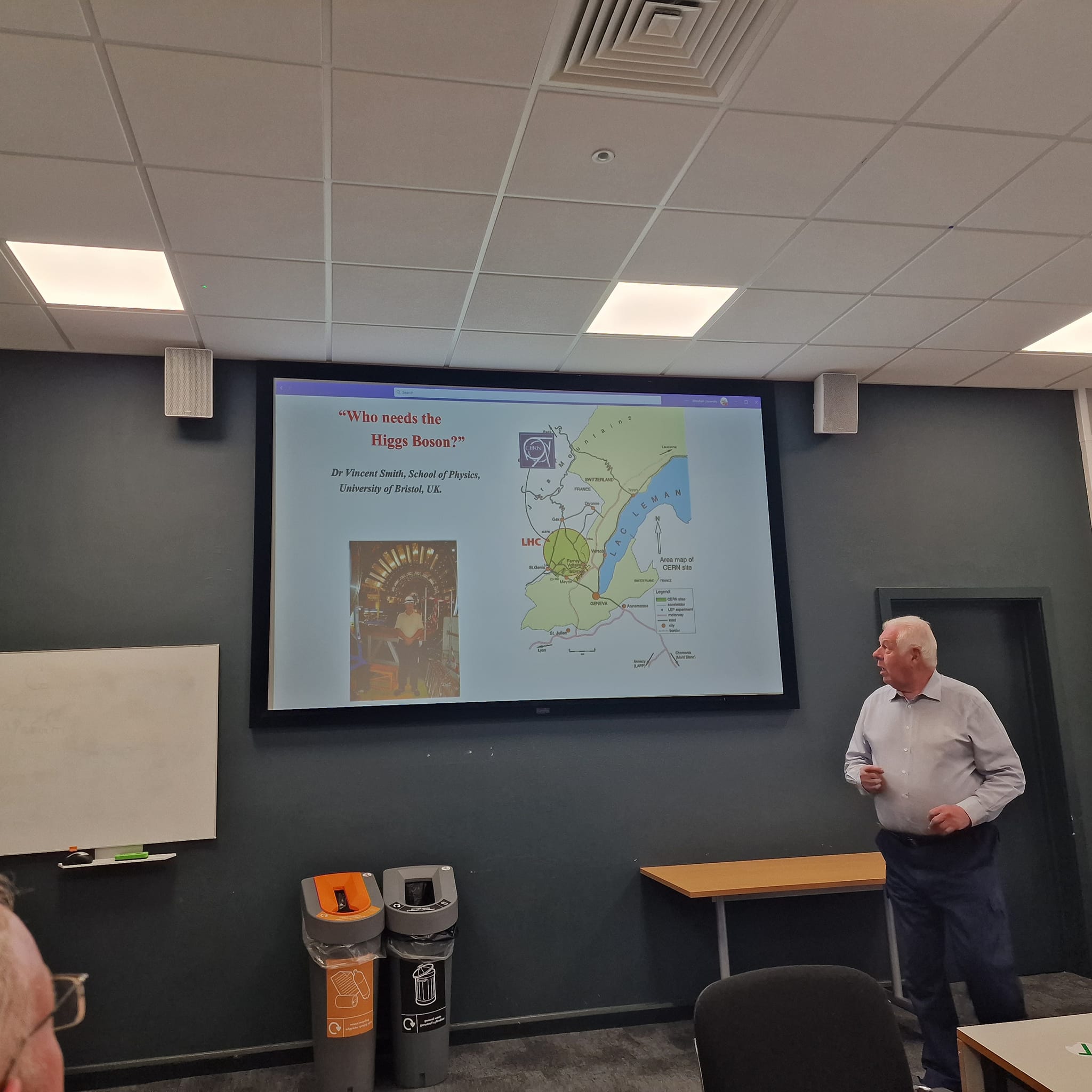
Friday Conference
The second day continued the main conference sessions, with more Visiting Professors, PhD students, and external academics presenting on a wide range of topics from applied mathematics, computer science, composites, historical figures in electricity, engineering, art, and pedagogy.
Dr Raj Nangia spoke about the effects of small variations in the design of combat aircraft wing transonic regime on the efficiency and stability of operation at all relevant sub- and super-sonic speeds.
He was followed by Computer Science PhD student Alexander Bruckbauer, whose research is a humanitarian project in support of mine clearance capability. He described a physical experiment using anti-personnel mine laying protocols to obtain training data for his Machine Learning research into mine location prediction.
Dr Andre Batako (Liverpool John Moores) gave a presentation on his research into the machining of hard to machine materials. He explained the effectiveness of his vibration assisted process in terms of localised repeated impacts.
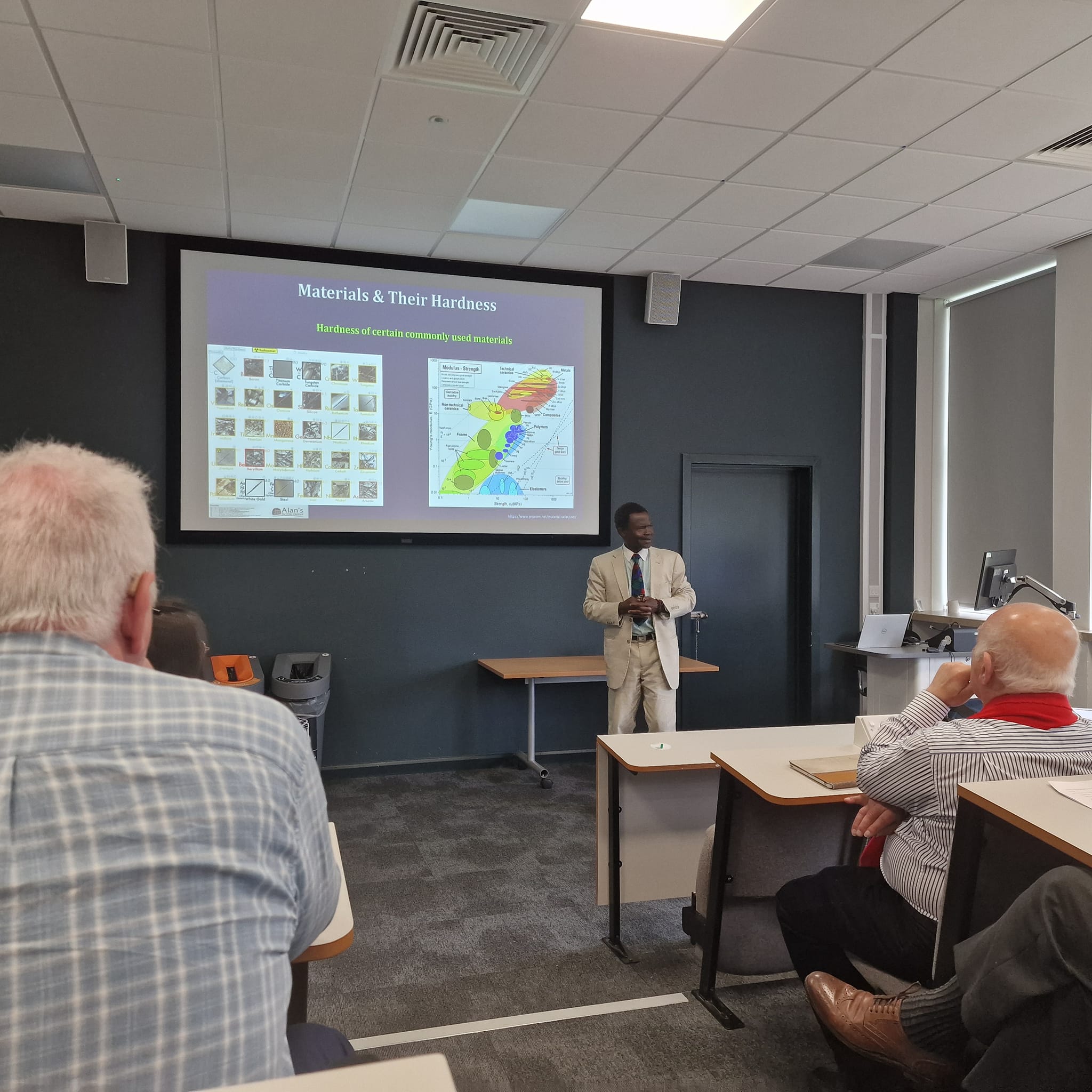
The final speaker of the morning session was Dr Vincent Smith, who gave a historical perspective on the life and work of Volta, Ampere, and Ohm, whose names are synonymous in the modern day with the electrical units of Volts, Amps, and Ohms.
After lunch, Visiting Professor Jonathan Blackledge spoke about wave scattering theory, and introduced the problem of summation over multiple higher order terms. He derived a method giving an exact solution under particular conditions.
Dr Paul Jones (WGU) gave an artist’s perspective on the developments in audio and visual recording technology. From the engineering and technology perspective, each development is an “improvement”, but the impact of the image or sound on the human viewer or listener is different.
After Liverpool John Moores’ PhD student, Ning Yan’s lecture there was a lot of informal discussion about student participation and the pros and cons of hybrid learning.
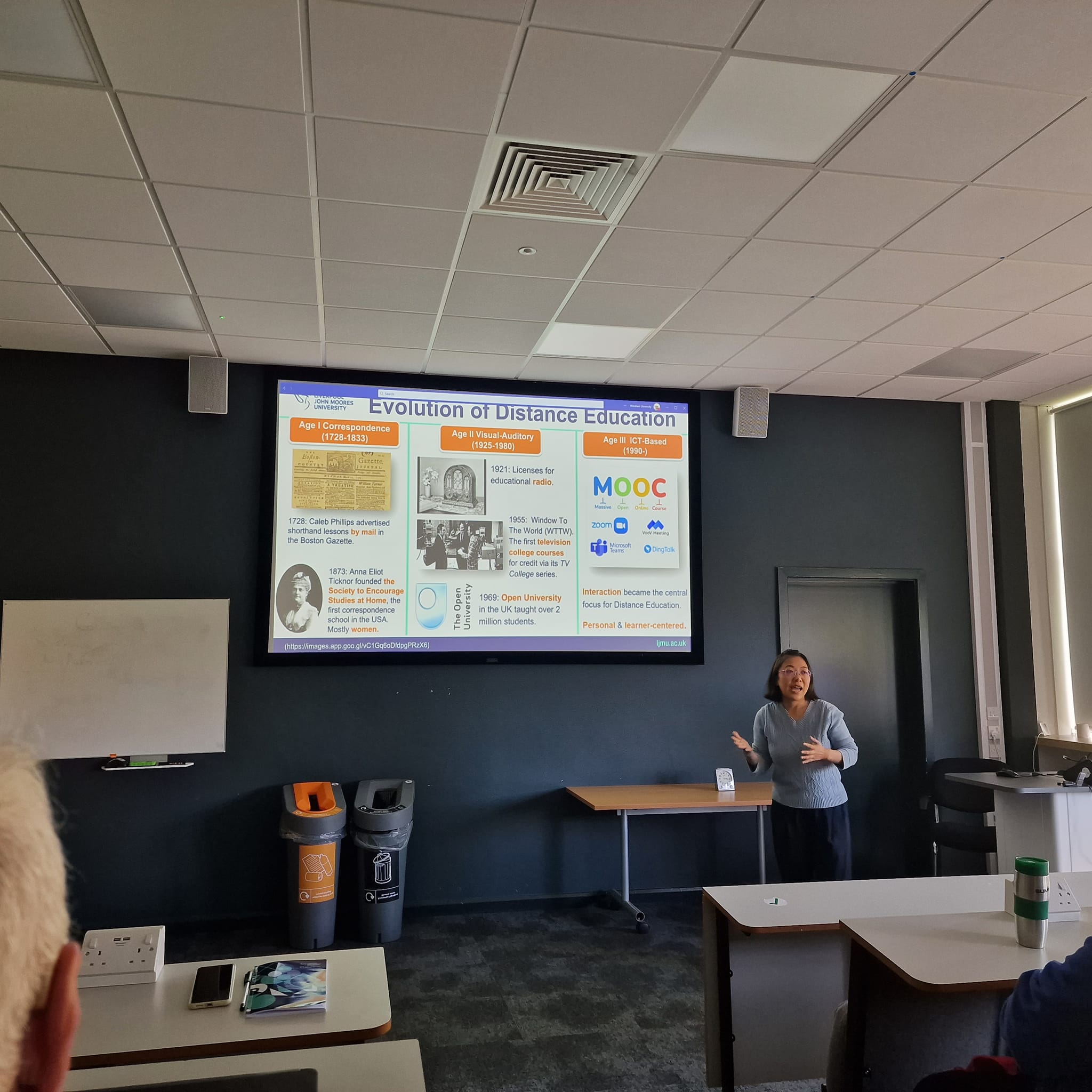
Prof. Ardeshir's Osanlou session reflected the interdisciplinary nature of the conference, where it was clear to all present how arts and engineering can collaborate.
Jack Birch, Research Administrator who attended the Friday sessions said:
"The discussions that arose from Friday’s lectures were invigorating. It was so positive to see how the interdisciplinary nature of the conference helped nurture diverse and novel approaches to the key issues of today and the future"
Professor Alison McMillan said:
"The CoMManDO Workshop and Conference provided an opportunity for Wrexham Glyndwr Researchers to meet with Alums, Visiting Researchers and Professors, and colleagues from neighbouring universities to meet and share research activities. We enjoyed learning in a transdisciplinary way, where our perceptions were challenged by many very different viewpoints.”
Presentations and other content.
The two days were a huge success, and we look forward to inviting you all back again next year. Meanwhile, if you’d like to become a member of CoMManDO Research Centre, please email your interest to Alison a.mcmillan@glyndwr.ac.uk